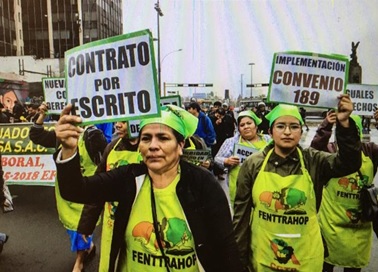The Social and Gender Policy areas of the EUROsociAL+ Programme joined forces with the Ministry of Labour and Employment Promotion (MTPE) to organise two talks on the importance of trade union organisation in the domestic work sector.

Foto: cortesía de FENTTRAHOP, presentada durante el conversatorio internacional sobre organización sindical.
Since last year, the European Union EUROsociAL+ Programme has been assisting the Ministry of Labour and Employment of Peru in the regulation and implementation of Law 31047 on Domestic Workers. This law, approved in 2020, settled a historical debt with more than 420,000 domestic workers in Peru. Within this framework, two international talks were organised whose objectives were to promote compliance with domestic workers’ labour rights and learn about the experiences of trade union organisations in other countries of the region.
The first of them, entitled “International exchanges on domestic workers’ trade union organising in Peru”, was held on 26 November 2021, two years after the entry into force of the Domestic Workers Convention, 2011 (No. 189), one of the most important milestones in the gaining of labour rights in recent times.
The first national panel began after a few words of welcome from Jans Erik Cavero Cárdenas, Director General of Fundamental Rights and Safety and Health at Work, and Robert Steinlechnet, Head of Cooperation at the EU Delegation to Peru, highlighting the importance of union organisation in the context of progress made in the country.
“This is one of the sectors that faced the greatest destruction of jobs as a result of the pandemic, one of the worst situations of worsening working conditions and high levels of contagion. The pandemic hit the domestic work sector hard. That is why it was important, in the midst of this enormous crisis, to have a law for female workers,” said Maria Elena Valenzuela, an expert at EUROsociAL+, who assisted the process of regulation and implementation of Law 31047.
There was also a presentation by Adelinda Diaz, Secretary General of the National Federation of Domestic Workers of Peru (FENTTRAHOGARP); Leddy Mozombite, Secretary General of the National Federation of Domestic Workers Peru (FENTTRAHOP), and Sofia Mauricio, representative of civil organisation AGTR-La Casa de Panchita.The speakers spoke about the paths travelled by trade union and civil society organisations for decades to pass this law. “We learned to mobilise virtually,” said Leddy Mozombite, referring to the recent challenge faced by the union movement during the COVID-19 pandemic. Adelinda Diaz said, “the commitment of the authorities and the work of the Intersectoral Bureau that has allowed us to contribute to this process.” The three participants celebrated the progress that the regulation of this law means for domestic workers’ rights.
The second panel proposed a dialogue between union organisations in other countries in the region. The panel began by presenting the international experience with Carmen Britez, vice president of the International Domestic Workers’ Federation (FITH) and secretary of the Union of Auxiliary Personnel of Private Houses of Argentina (UPACP), who said that despite the high number of ratifications of C189 in the region, the challenge of putting the principles of this Agreement into practice remains. Natalia Santos, Legal Advisor of the Unión Personal Auxiliar de Casas Particulares (Union of Auxiliary Staff in Private Houses (UPACP)) highlighted the progress made with the new legislation, adopted within the framework of C189. Uruguay’s experience was presented by Lucía Gándara, president of the Sindicato Unico de Trabajadoras Domésticas (Single Union of Domestic Workers (SUTD)) and finally, the Chilean situation was explained by María Juana Collado, Treasurer of the National Federation of Domestic Workers (Federación Nacional de Trabajadoras de Casa Particular (FESINTRACAP), who summarised the national struggle for the formalisation of domestic work.
Edilberto Sergio Jaime Ríos, Vice Minister of Labour, closed the event, ratifying his commitment to the law and thanking EUROsociAL+ for its support.
The second conference, “Experiences and expectations in the implementation of the home work registry”, was held on November 29. Edilberto Sergio Jaime Ríos attended the opening with Robert Steinlechner. On this occasion, the speakers talked about the collaborative work carried out in Peru for the regulatory proposal of Law No. 31047, Law on domestic workers, and the challenges to its implementation, a process with which EUROsociAL+ has been assisting from the Social and Gender Policy area.
On this occasion, the former Minister of Labour of Uruguay, Ernesto Murro, participated in order to collect contributions of comparative experience for the implementation of the Unified Registry of Household Work. Also present were Dante Raúl Moreno, EUROsociAL+ expert; Juan Carlos Granda, representative of SUNAT and William Davis Rengifo Tam of the General Office of Statistics and Information and Communication Technologies of the MTPE. Once again, the event was closed by the Deputy Minister of Labour of Peru.
The new regulations in Peru govern and safeguard the labour rights of workers with minimal protection and formality because unregulated employment in private homes is close to exploitation and servitude if there are no formal working hours, minimum wages, the right to rest or social protection. These rights should not be absent in the 21st century. This law dignifies the sector and empowers the people – mostly women who are poor, rural and indigenous – who are employed in it.



